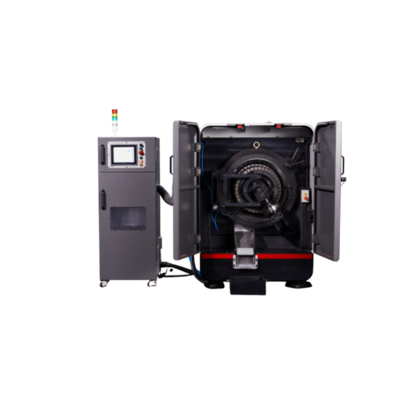Nail making machines are pivotal in the manufacturing industry, transforming raw materials like steel wire into essential construction components. These machines have seen significant advancements over the years, incorporating cutting-edge technology to enhance efficiency and production quality. The process begins with the wire being fed into the machine, where it is cut to the desired length. Subsequently, the machine forms the nail’s head and sharpens the tip. Precision is paramount at each step to ensure the nails meet strict quality standards, making these machines indispensable for large-scale nail production.
Modern nail making machines boast various features aimed at optimizing the production process. Automatic wire feeders provide a continuous supply of raw materials, minimizing downtime and boosting throughput. Precision cutting mechanisms ensure uniformity in nail length, while advanced forming tools shape nail heads with high accuracy. Many machines are equipped with computerized control systems, allowing operators to monitor and adjust production parameters in real-time. This integration of technology not only improves efficiency but also enhances the overall quality of the nails produced, making these machines a critical asset for manufacturers.
The choice of raw materials is crucial in nail making. High-quality steel wire, known for its strength and flexibility, is the preferred material. This wire must be free from impurities and defects to ensure the nails‘ durability and reliability. Manufacturers often source their wire from reputable suppliers who meet rigorous industry standards. The meticulous selection of materials ensures that the finished nails can withstand the stresses of their intended applications, from construction to home improvement.
The evolution of nail making machines has been driven by the need to reduce production costs and enhance competitiveness. Automation plays a significant role in achieving these goals, reducing the reliance on manual labor, minimizing human error, and speeding up production. Modern machines are designed to optimize material usage and minimize waste, further lowering production costs. These efficiencies translate into higher profit margins for manufacturers, enabling them to compete effectively in the global market.
Nail Production Machine
A nail production machine is a sophisticated piece of equipment designed to handle the comprehensive process of nail manufacturing, from feeding raw materials to packaging the finished products. These machines are specialized for different types of nails, such as common nails, roofing nails, and specialized nails for specific applications. Each machine type is tailored to produce nails that meet stringent industry standards, ensuring consistency and high quality in every batch.
The nail production process involves several stages, starting with the feeding of steel wire into the machine. The wire is then straightened and cut to the desired length. The next stage involves forming the nail’s head, followed by any additional steps required for specific nail types, such as threading or grooving. The final stage is sharpening the nail tip to ensure it can easily penetrate materials. Each stage must be meticulously controlled to maintain the consistency and quality of the nails.
Technological advancements have significantly improved the performance of nail production machines. Features such as servo motors and pneumatic systems provide precise control over mechanical movements, enhancing accuracy and flexibility. Integrated inspection systems use sensors and cameras to detect and reject defective nails automatically, ensuring only high-quality nails proceed to the packaging stage. These innovations not only improve production efficiency but also elevate the overall quality of the finished product.
Maintenance is vital for the optimal operation of nail production machines. Regular tasks include lubricating moving parts, replacing worn components, and calibrating the machine to maintain specified tolerances. Preventive maintenance helps avoid unexpected breakdowns and costly downtime. Manufacturers provide detailed maintenance schedules and guidelines to help operators keep their machines in top condition, ensuring continuous, efficient production.
Operator training is also crucial for efficient machine operation. Skilled operators can identify potential issues, perform minor repairs, and optimize machine settings for maximum efficiency. Training programs and certification courses provided by manufacturers ensure that operators have the necessary knowledge and skills to operate the machines safely and effectively. Investing in training and maintenance not only extends the machine’s lifespan but also maximizes productivity and profitability.
Nail Manufacturing Machine
The nail manufacturing machine is the heart of the industrial nail production process, designed to handle high-volume production efficiently. These machines transform raw steel wire into various types of nails, including common wire nails and specialty nails for specific applications like construction and upholstery. The manufacturing process involves multiple stages, from selecting high-quality raw materials to forming, threading, and finishing the nails.
High-quality steel wire is the preferred material for nail manufacturing due to its strength and durability. The wire is first straightened and then cut into lengths corresponding to the desired nail size. The machine then shapes the head and forms the shank of the nail through a series of dies and punches. Additional steps, such as threading or coating, may be required for certain types of nails. Each stage is carefully controlled to ensure the nails meet precise specifications for size, shape, and strength.
Advanced technologies have been integrated into nail manufacturing machines to enhance their performance and reliability. Computer numerical control (CNC) systems allow for precise control over the manufacturing process, enabling operators to program specific parameters and ensure consistent quality. Automated quality control systems inspect each nail for defects, ensuring that only high-quality products are packaged and shipped. These technological advancements have significantly improved the efficiency and quality of nail production.
Efficiency is a key factor in nail manufacturing. High-speed machines capable of producing thousands of nails per minute are essential for large-scale production environments. These machines are designed to minimize waste and maximize raw material use, reducing production costs and increasing profitability. Quick-change tooling systems allow operators to switch between different nail sizes and types with minimal downtime, further enhancing productivity.
Safety is another critical aspect of nail manufacturing. Machines are equipped with various safety features to protect operators, including guards, emergency stop buttons, and automatic shutoff mechanisms. Proper training and adherence to safety protocols are essential to ensure safe and efficient operation. Manufacturers provide comprehensive training programs to help operators understand machine safety and maintenance, contributing to a safer work environment.
Environmental considerations are increasingly important in the manufacturing industry. Modern nail manufacturing machines are designed with energy efficiency in mind, incorporating low-power motors and energy-saving modes. Manufacturers are also exploring eco-friendly materials and coatings to reduce the environmental impact of their products. By adopting sustainable practices, the nail manufacturing industry can contribute to a greener future while maintaining high standards of quality and performance.
Thread Rollers
Thread rollers are specialized machines used in the nail manufacturing process to create threads on the shank of nails, screws, and other fasteners. Threaded nails provide enhanced holding power and resistance to pullout, making them ideal for various applications. Thread rollers work by deforming the surface of the nail shank through a rolling process, where the nail is pressed between hardened steel dies with the desired thread pattern. This process strengthens the nail by compressing the material and aligning the grain structure along the threads.
The operation of a thread roller involves several key components, including dies, feed mechanisms, and control systems. The dies are crucial as they determine the thread’s shape and pitch. High-quality dies ensure precise and consistent thread formation. The feed mechanism controls the speed and orientation of nails entering the machine, while the control system allows operators to adjust settings and monitor the process. Advanced thread rollers may feature CNC controls, providing greater precision and flexibility in thread production.
Thread rolling is preferred over other threading methods, such as cutting or grinding, for several reasons. The rolling process strengthens the nail by compressing the material, resulting in a stronger product. It is also more efficient, producing threads quickly with minimal waste. Rolled threads have a smoother surface finish, enhancing the nail’s performance and appearance. These benefits make thread rolling the preferred method for creating high-quality threaded nails.
Maintaining thread rollers is essential for consistent quality and performance. Regular maintenance includes inspecting and replacing worn dies, lubricating moving parts, and checking feed mechanism alignment. Preventive maintenance helps avoid unexpected breakdowns and extends the machine’s lifespan. Operators should be trained to perform routine maintenance and identify potential issues, ensuring the machines operate efficiently.
Innovation continues to drive improvements in thread rolling technology. Developments include more durable die materials, automated inspection systems, and enhanced control systems for greater customization of thread patterns. These advancements enable manufacturers to produce high-quality threaded nails more efficiently and precisely. As demand for specialized fasteners grows, thread rolling technology will play an increasingly important role in the manufacturing industry.
Summary
In summary, nail making machines, nail production machines, and nail manufacturing machines are crucial for producing high-quality nails used across various industries. These machines, along with specialized thread rollers, have evolved to incorporate advanced technologies that enhance efficiency, quality, and reliability. By investing in state-of-the-art equipment and proper maintenance, manufacturers can ensure the consistent production of superior nails. For more information on these innovative machines, visit Zeus Techno.





2 comments
https://4ekonom.sk/
https://4hobby.sk/
https://aktual24.sk/
https://aliving.sk/
https://azhome.sk/
https://azliving.sk/
https://azstavby.sk/
https://ekonom24.sk/
https://eurobiznis.sk/
https://financnenoviny.sk/
https://fond.sk/
https://hot.sk
https://mladysvet.sk/
https://netradicnebyvanie.sk
https://podnikatelky.sk/
https://prave.sk/
https://prima24.sk/
https://remix.sk/
https://riziko.sk/
https://time24.sk/
https://vasdomov.sk/
https://vasebyvanie.sk/
https://weekend.sk/
https://zoznam24.sk/
strategie24.sk
https://svetliving.sk/
https://dennikeuro.sk/
https://vyrobky.sk/
https://magickebyvanie.sk/
https://vyrobca.sk/
https://teleskop.sk/
https://rubikon.sk/
https://financepro.sk/
https://emuzi.sk/
https://nova24.sk/
https://esso.sk/
https://denniky.sk/
https://weblight.sk/
https://hi-techmag.sk
https://prozenu.cz/zazijte-prave-safari-krugeruv-park-a-divocina-jizni-afriky/